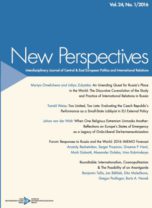The Literary Exception:Reflections on Agamben’s “Liberal Democratic” Political Theology and the Religious Destabilisation of the Political in our Time
The Literary Exception:Reflections on Agamben’s “Liberal Democratic” Political Theology and the Religious Destabilisation of the Political in our Time
Author(s): Johan Van der WaltSubject(s): Politics / Political Sciences
Published by: Ústav mezinárodních vztahů
Keywords: Agamben; Nancy; Schmitt; Political Theology; Liberalism
Summary/Abstract: The concern with stabilising the political and avoiding the excessive deployments of coercive force by totalitarian political imaginations is usually associated with political liberalismand liberal political theory. It is rarely associated with political theology and conceptions of sovereignty that are based on political theology. The unique contribution of the Italian philosopher Giorgio Agamben to contemporary political theory is the opportunity it offers to contemplate the stabilisation of the political in terms of political theology and not in terms of typical rule of law arguments that one would associate with political liberalism. The aim of this article is to trace and question some of the essential thoughts on the basis of which Agamben puts forward the idea of the called existence of the Christian community. It does so in order to put forward, in response, an argument for a literary community that has much in common with Agamben’s conception of the Christian ekklesia, but ultimately also differs fromit in certain important respects. The argument for a literary community that is developed ultimately has more in common with Nancy’s conception of an “inoperative community”. The article also offers a close scrutiny of Agamben’s engagement with the work of Carl Schmitt. This scrutiny of Agamben’s engagement with Schmitt is crucial for the argument that the article forwards, considering the way in which Schmitt’s work is with good reason historically linked to exactly the kind of political theology that destabilises rather than stabilises the political.
- Issue Year: 23/2015
- Issue No: 1
- Page Range: 15-44
- Page Count: 30
- Language: English
- Content File-PDF

